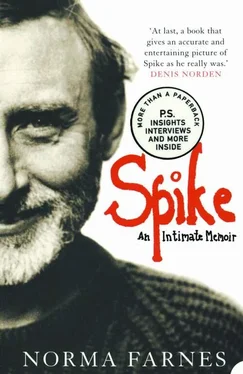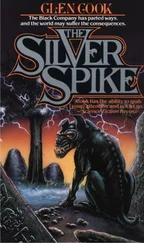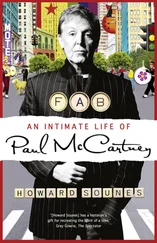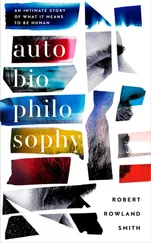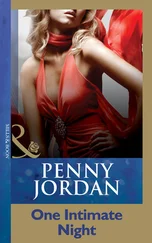He turned to me, pointing at the birds. ‘That’s Hoppity. He’s a bugger, first every time. I reckon he’s an argumentative sod, always in fights. I bet that’s why he’s lame.’ He sat down behind a table and gazed at me, nothing rude about it, more of a dispassionate survey, I felt. ‘You’ve got legs just like Olive Oyl,’ he said. ‘Who’d want to make love to an elastic band?’
‘Another elastic band.’
He grinned. ‘You’ll do for me.’
I wondered whether he would do for me.
He told me that at the end of February he was going to Australia to see his parents and do some work. When he came back at the end of June he would be in touch. I had not bargained for that but decided to stick with my job at the Independent Television Companies’ Association (ITCA) in the meantime, keeping an eye open for a vacancy in television production. I quite fancied working for Spike so if nothing spectacular came up I would wait for his call.
June came and went and he had not rung. Then the Alfred Marks Bureau called. They wanted my permission to give Spike my telephone number, which he had lost. A few minutes later the phone rang.
‘Spike here. I’m back from Oz. Do you want to come and see if you still want to work in this madhouse?’
I had had long enough to consider whether it was the right move but there would be no harm in seeing him again. So off to Number Nine for the second time. And I met a completely different Spike: bright, alert and brimming with energy. Yes, I thought, I’ll give it a whirl, if only for a few months. It might be fun.
I told him I would have to give a month’s notice to the ITCA so could start at the end of August. That was fine by him because he was taking his family on holiday to Tunisia so would see me again on 29 August. He took me downstairs to a room immediately behind reception and left me with his agent, David Conyers, to sort out the details. David suggested I start early and have a week to settle in before Spike’s return. It was all very informal. Yes, I thought to myself, it could be very pleasant working here.
I could have been born in a different galaxy from the frenetic world of Number Nine. In fact it was at 45 Barnard Street, Thornaby On Tees, on New Year’s Eve 1934. The town, tucked between Middlesbrough and Stockton, was still suffering from the deprivations of the Depression. My father was lucky with a construction job at ICI Billingham, a dangerous occupation but comparatively well paid. My mother was a rarity in those pre-war years because she was a working mum and served behind the counter of Robinson’s, an upmarket department store.
At that time sons and daughters generally lived in the same neighbourhood as their parents and family ties were strong, if somewhat binding for those with an instinct to break the mould. After school, when my friends had tea with their mums, I went to my maternal grandmother’s house, two doors away from our own. When Mum finished work she often came for tea with us, not a dainty Ritz-like affair with cucumber sandwiches but a knife and fork meal with ham and salad or a Newbould’s pork pie.
My parents were judged to be somewhat unusual. They were among the very few people on our street to cast their votes for the Conservative Party and did not mind who knew it. And although my straight-as-a-die Dad conformed to the archetype of the working man in that he was a sports fanatic, there the resemblance ended. He went to his barber every Saturday morning, not just for a haircut but a manicure. He must have been the only manual worker on Teesside to do so. He was also a non-smoker and almost teetotal, but could be persuaded to have a whisky at Christmas. And he was potty about variety theatre.
As soon as he decided I was old enough Dad took me with him to the Middlesbrough Empire on Wednesday evenings, Saturdays too if there had been a change of act during the week. The ritual never altered. At the interval he would say, ‘Come on. We’ll go and see Ally at work in the Circle Bar.’ In fifteen minutes Ally could serve more pints than it is possible to imagine. Although a big woman she would swoop gracefully from customers to the pumps, arrange six pint glasses in a hand as big as a navvy’s and fill them with just the right amount of froth on top. Then in one fluid movement she would bang the pints down, take the money, scatter change on the counter and somehow pull another six.
Visitors from out of town were told not to miss Ally. Even the artistes came to witness her performance. ‘She’s a class act,’ my father claimed he heard one customer tell a comedian who had died before the interval. ‘Better than owt on stage. So far, that is.’
Dad’s favourite acts were peerless comic Jimmy James; Wilson, Kepel and Betty, the sand dancers; comedians Rob Wilton and Billy Bennett, and the incomparable G. H. Elliott, who, blacked-up, sang ‘Lily of Laguna’ hauntingly as he glided across the stage. Above all Dad idolized a great ballad singer, fiery Dorothy Squires. After meeting in the Empire bar they became friends and he looked out for her, not that she needed any help because she could be as tough as a bar-room brawler. Whenever she was within travelling distance of Thornaby Dad would be in the audience, and through all her tempestuous affairs he was the one who listened quietly to talk of her latest love and the inevitable parting which had given her so much pain – temporarily at least, for there was always a new man in her life. (This was before she married Roger Moore.)
Dad knew that Dorothy could be a demanding monster with the hide of a politician, and, like many of that breed, she was often ruthless and unforgiving. But because of her talent he excused her frailties. She was the very opposite of my mother. Mum never threw tantrums, was content with her lot and, in the jargon of today, she gave Dad space to enjoy his interests. It was not all one-way traffic, though. Mum took the view that what was good for him was good for her so she went to the local dance halls with her girlfriends. Strange as it may seem, I am sure neither of them strayed.
My parents often went backstage to see Dorothy after the curtain came down and one evening, when I was about twelve years old, they took me along with them. I was utterly bewitched by this glamorous singer.
As well as inheriting my parents’ love of entertainment I also picked up their pecuniary habits. In those depressing times half the men in our street were unemployed and dependent on the dole and often the pawnshop. If they could wangle something new for the house it would be on hire purchase. My parents considered this a device of the devil. If they could not pay cash they did without.
Religion played a large part in my mother’s life. She said her prayers every night until she died so it was not surprising that I was sent to Sunday School from an early age. It was never a chore to me and at fourteen I was asked to teach the younger children there. I did it for three years until I fell out with the new vicar.
Everyone in my extended family seemed content with their way of life, as they remain to this day, and yet in my teens I had an urge to get away, to broaden my horizons and to travel. There had to be something more interesting than a future in Thornaby.
Many people reminisce about golden school days but they could not end soon enough for me. I was good at shorthand and typing, becoming sufficiently proficient to teach both for a time at night school, but did not shine at anything else apart from sport. After I left at sixteen my first job was at Head Wrightson, a local steelworks, as receptionist, typist, telephonist and general dogsbody. The manager, a Mr Cussons, treated everyone with charm and courtesy and inspired a family atmosphere. But as with most families, there was an awkward one, the pinstriped junior manager of our small office. Bombastic and opinionated were his better traits. One day some money was found to be missing and he as good as accused me of stealing it. When I went home that evening I told my father. He was furious.
Читать дальше
